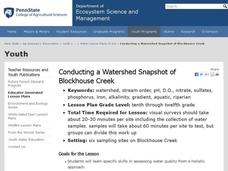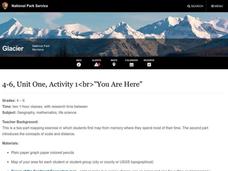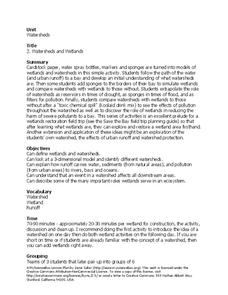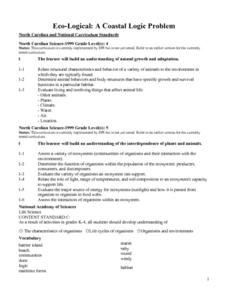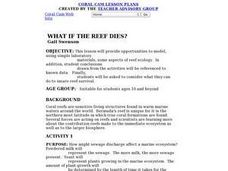Curated OER
Obis Oil Spill
Students explore environmental challenges by participating in an oil spill simulation. In this water safety lesson, students discuss why oil spills happen and how their impact affects the entire ecosystem. Students utilize popcorn,...
Curated OER
"Conducting a Watershed Snapshot of Blockhouse Creek"
Students examine specific skills in assessing water quality from a holistic approach. They assess the health of a local watershed and identify problems in the local watershed and suggest remediation.
National Geographic
Rescuing, Relocating, and Rehabilitating Wildlife
Bring up the Deepwater Horizon (BP) oil spill that occurred in the Gulf of Mexico in 2010. Display the colorful diagram of the coastal and marine organisms living in the area. Show a video about relocating the eggs of the Gulf's sea...
Curated OER
You Are Here
Students map local places and learn to use scale and distance. In this mapping lesson, students map their school and a favorite place. Students recreate their maps showing distance and scale sizes. Students locate their location on a...
Virginia Department of Education
DNA Extraction from Strawberries
Has your class ever been astounded by the complexity of DNA analysis? Have they ever asked why genetic engineering has become so important to our daily lives? Young scientists perform DNA extraction on strawberries and explore how the...
University of South Carolina
Home Sweet Home
Fifth graders will research a biome (land or aquatic) and create a project (diorama, model or another idea of the student's choosing) which includes the geographic features of that biome as well as plants and animals found there and...
Curated OER
Watersheds and Wetlands
Learners simulate a chemical spill. In this watersheds and wetlands lesson, students build a watershed and observe what happens when it rains. Learners add wetlands to their watershed models and examine the effects of water pollution.
Curated OER
Wetland Metaphors
Students are presented with a selection of hands on objects for investigation as metaphors for natural functions of wetlands. A 'Mystery Metaphor Container' is presented to the class with everything having to do with a wetland in some...
Curated OER
Sounds of the Wetlands
Students identify the sounds of different bird calls. For this biology lesson, students create a sound map. They explain how this method is important in tracking wildlife.
Curated OER
Wetland Habitats
Eighth graders explore the program Alice and the Internet to research wetland habitats. In this habitat lesson students build their own Alice world that includes wetland habitats, food sources and ways to protect the habitats.
Curated OER
All Hands on Deck: A Harbor Education Program
Young scholars build a model of an estuary. In this wetland lesson, students build a model estuary with a paint tray and modeling clay. They use the model to illustrate the impact of non-point pollution on the watershed.
Curated OER
What Can You Do?
Students explore reasons for the destruction of the wetlands and identify ways people can help protect them. They create and design a wetlands conservation poster to be presented to the class.
Curated OER
Bird airport control
Students identify the various species of birds found in the wetlands. Students observe and record the key skills involved in scientific inquiry. Students handle and interpret data gathered on a field trip which reveals patterns and...
Curated OER
Rock-a-bye Babies in a Wetland
Students review the way human babies grow and what type of care they need. Using the internet, they are introduced to five different wetland habitat animals and how their babies grow. They discover how they are born and what the...
Curated OER
Marshland Wonders
Students review the characteristics of wetlands and list their benefits. After viewing short videos, they identify the organims that make their home in wetlands and how they have adapted. They compare and contrast the characteristics...
Curated OER
Lake Log: Diary of the Basin
Students log news articles about the changes in the Lake Pontchartrain Basin. In this wetlands and news lesson, students track articles about the wetlands area around Lake Pontchartrain, write brief summaries, include pictures, and put...
Curated OER
Music of the Estuary
Learners explore the sounds of the estuary. In this wetlands lesson, students discuss how to simulate the sounds of nature. Learners write and record a musical score featuring the sounds of the wetlands.
Curated OER
Magical Images of the Estuary
Pupils investigate picture taking techniques while visiting an estuary. In this picture taking lesson, students examine the "Magical Images of the Estuary" handout. They think of and list important picture taking techniques before...
Curated OER
Watersheds and Wetlands
Students investigate watersheds and wetlands. In this watersheds and wetlands instructional activity, students complete a 17 step lesson plan to build a watershed. Students then complete another 9 step instructional activity to build a...
Curated OER
What's a Swamp Good For?
Students identify the function and value of wetlands. In this lesson on appreciating wetlands, students explain how different household items can represent different aspects of the wetlands.
Curated OER
Eco-Logical: A Coastal Logic Problem
Fourth graders study the characteristics of five coastal communities. They use logic cards and matching activities to identify the proper community for plant and animal species.
Curated OER
The Macaroni Lab
Pupils are given an introduction to the "ecosystem", what factors make up an ecosystem (biotic factors, abiotic factors, food chain, producers, consumers and decomposers) and how those factors interact.
Curated OER
What If the Reef Dies?
Students complete four activities to investigate how reef ecology can change. They perform experiments to show how sewage discharge can affect a marine ecosystem, look at substances that don't dissolve in water, examine wave action...
Curated OER
Ecological Citizen
Students examine the interconnectedness of living and non-living things that constitute an ecosystem. They examine fallen trees,insects, living trees, leaves, food webs, and forests. They conduct various activities and write poems about...



